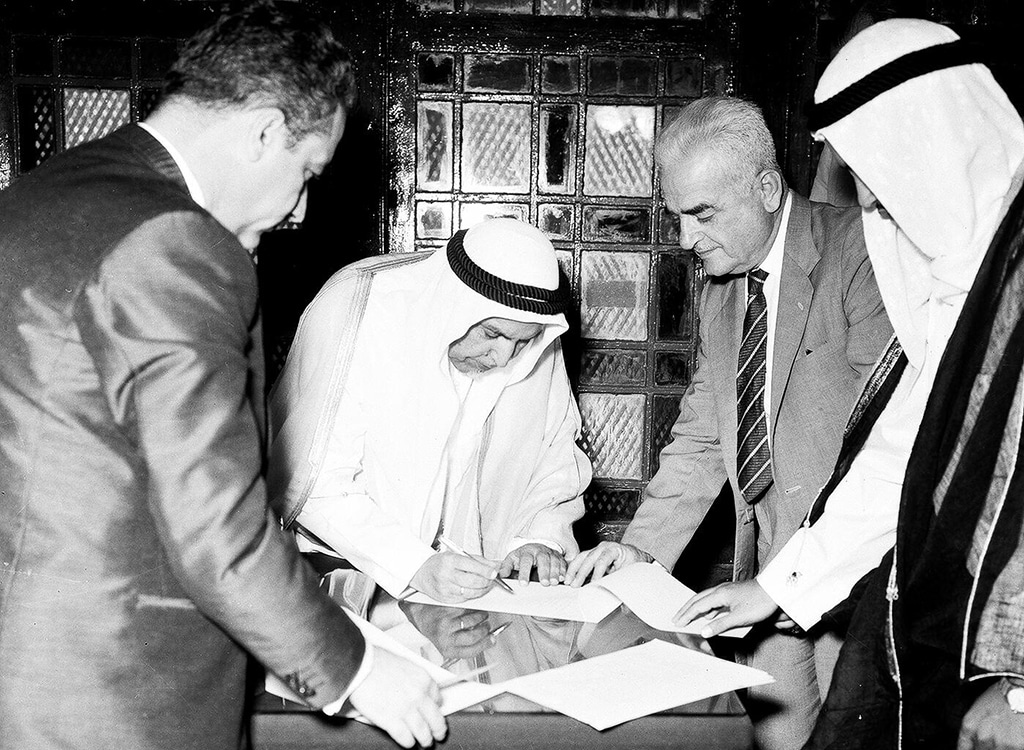KUWAIT: June 19, 1961 has always been engraved in hearts and minds of the Kuwaiti people. It was the day the State of Kuwait announced its independence and sovereignty as an Arab nation. The historic day marked the beginning of modern Kuwait era. It was the day when the declaration of independence was signed and the protectorate treaty with the British Government ended; the first step towards prosperity and development. The late Amir Sheikh Abdullah Al-Salem Al-Sabah realized that the protectorate treaty, signed by Sheikh Mubarak Al-Sabah in 1899, was not valid anymore because of the development of the political and economic conditions in the State of Kuwait.
Sheikh Abdullah Al-Salem announced the cancellation of the treaty by signing the declaration of independence with the British Government Chief Political Resident in the Arabian Gulf Sir George Middleton. "On this memorable day of our beloved nation, on which we move from one phase to another of history and fold another page of the past with all its components and contents, to open a new page represented in this declaration which you read now, whereby Kuwait gained its full independence and sovereignty," Sheikh Abdullah Al-Salem said after signing the declaration.
 The late Amir Sheikh Abdullah Al-Salem delivers a speech on the occasion of Kuwait's independence on June 19, 1961.
The late Amir Sheikh Abdullah Al-Salem delivers a speech on the occasion of Kuwait's independence on June 19, 1961.Date change
The first independence anniversary was held in 1962, and a decree was signed on May 18, 1964 which merged the national day with the day in which Sheikh Abdullah Al-Salem assumed office, making it February 25, and celebrations were held on that date since 1965. Since assuming office in 1950, Sheikh Abdullah Al-Salem took carefully studied steps towards independence, achieving stability and instructing the writing of the nation's Constitution. On September 7, 1961, an Amiri decree was signed specifying the shape and colors of the Flag of Kuwait. The State of Kuwait became member in the Arab League on July 20, 1961. Sheikh Abdullah Al-Salem signed a decree on August 26, 1961 to hold elections of the Constituent Assembly, which had a mandate of writing a constitution. The 183-article constitution was completed in nine months. The constitution was a gift for the Kuwaiti people, putting them on the path of progress and prosperity as well as offering a new democratic life.
Achievements
The 15-year reign of Sheikh Abdullah Al-Salem, who was called "father of independence" and "father of constitution", was full of achievements. The State of Kuwait accomplished 43 laws and legislations, including the nationality law, monetary law, passports law and the organization of government departments. New departments were established in order to cope with the development of the nation, like public works, health, publication, knowledge, municipality, post and telephone, electricity and water, social affairs, awqaf, radio and television.
Over 61 years, the State of Kuwait took steady strides towards comprehensive development, supporting international legitimacy and human rights, rejecting interference in affairs of other countries, as well as being a strong believer in the role of the UN in protecting international peace and security. The State of Kuwait, under leadership of His Highness the Amir Sheikh Nawaf Al-Ahmad Al-Jaber Al-Sabah and His Highness the Crown Prince Sheikh Mishal Al-Ahmad Al-Jaber Al-Sabah, continued its domestic development process, and pursued its preventive diplomacy visa-vis conflicts worldwide. - KUNA











